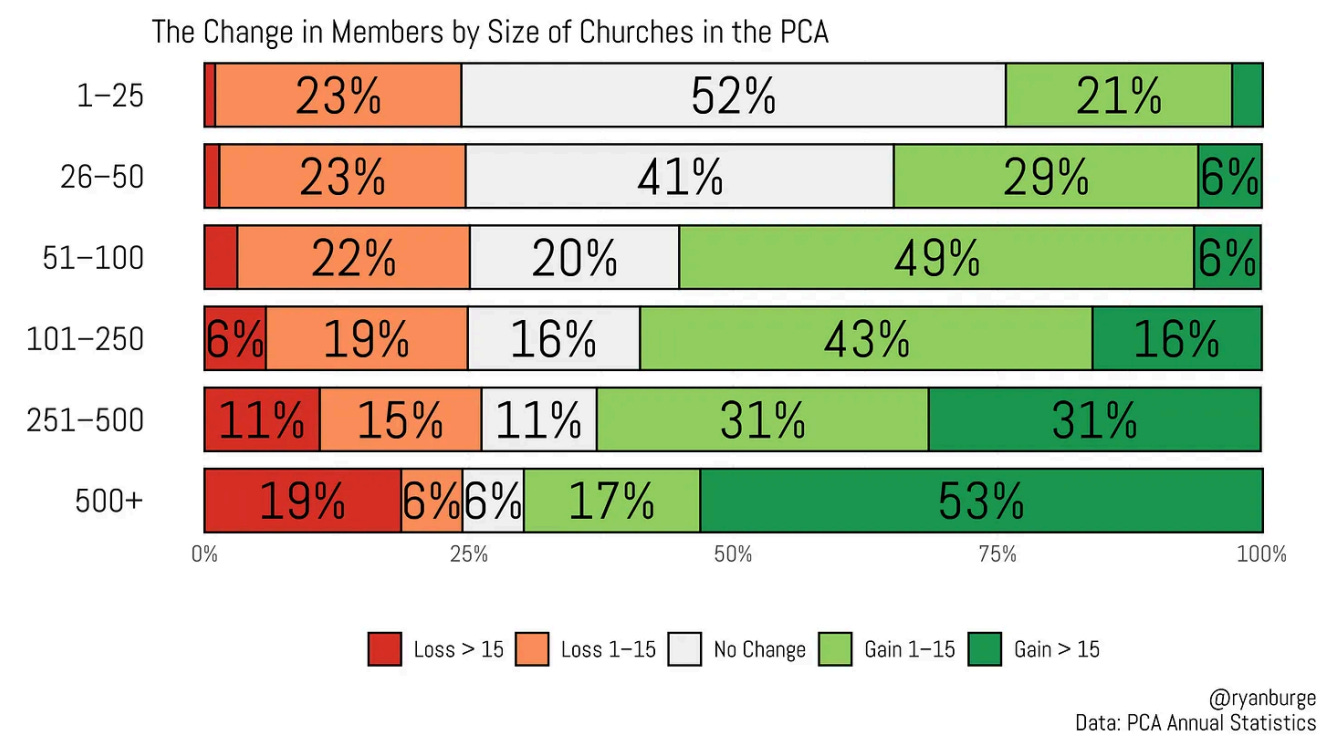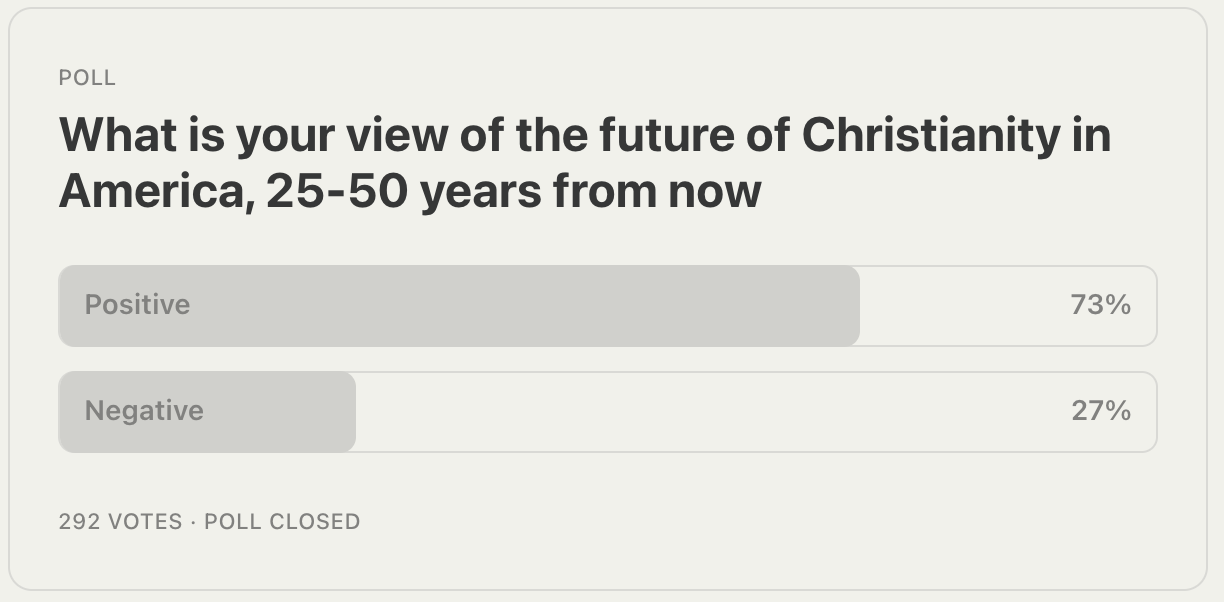The New Masculinity Map
Dating in Silicon Valley, Mommy mags, Gen Z talent, church dynamics and more in this week's roundup.
Remember, I will send you a free $5 Chik-fil-A gift card if you refer two people who sign up as free subscribers to my newsletter. Please use the button below.
Limit one per person. Limited to the first 100 people to claim it. Those who have had previous referral rewards are not eligible due to Substack limitations, unfortunately.
The Map of Manhood
Scott Alexander’s Astral Codex Ten is one of the top Rationalist inflected publications out there. He’s been running a series of guest post from readers posting their reviews of various things. They are very good, if sometimes long.
This week he published a review from a woman talking about her experiences dating men in the Bay Area, and what that’s taught her about how men are not alright.
She has a very interesting, and broadly accurate description of what she describes as our society’s unstated new map of manhood:
So if you squint hard enough at the murky sea of conversation about gender, you can make out the following steps to become a man:
1. Reject toxic masculinity.
a) It’s your job to understand what this means, despite the definition of “toxic masculinity” being nebulous and ever-changing.
b) If you’re uncertain whether you fit the definition, you’re probably doing something wrong and should feel ashamed. To play it safe, act as demure as possible and avoid risk-taking.
i) If you adopt these mannerisms and it harms your romantic pursuits, do not complain.
2. Be your authentic self!
a) Your authentic self should not be: dominant, highly interested in sex, competitive, emotionally reserved, prone to risk-taking, bad at reading emotions, stoic, or interested in power.
b) You should consider many of your “masculine” personality traits to be symptoms of a poisoned society, rather than potentially inborn characteristics, and feel ashamed if they exist within you.
i) Don’t bring up the multitude of scientific studies that question this belief.
c) Once you figure out how to repress unwanted traits, people may still decide that Yourself ™ is unwanted or problematic. It’s your responsibility to figure out their concerns and how to accommodate them.
3) Provide for and protect others.
a) It’s your duty to use your privileges and strength as a man to defend the weak and uplift the less-privileged.
b) Understand that “providing” doesn’t mean making money and “protecting” doesn’t mean physical protection; those are outdated concepts that reinforce the patriarchy. Provide emotionally and protect against systemic injustices.
i) If you fail to provide money and physical protection (or at least a physically capable physique), you’ll be locked out of many relationships. But don’t complain about this discrepancy between stated and actual expectations.
4. Stop obsessing over “being a man.”
a) Gender roles are toxic, especially masculine ones, and it’s pathetic to care so much about being manly.
i) Yes, gender is so vital to our self-identity that many trans individuals would rather commit suicide than be forced to repress their gender. But it’s toxic for biological men to adopt manhood as a vital part of their identity, so just stop it.
5. Don’t expect anything in return for fulfilling these requirements.
a) This would be demanding a reward for meeting the bare minimum requirements, and that would make you gross and entitled.
Click over to read the whole thing.
Pro-Children Media
We look to influential, stylish media to tell us what’s cool or in fashion. Often that’s major publications we know like Vogue magazine. But it’s also smaller, niche, elite publications.
I’m aware of at least two very stylish publications that target families with children, and portray how that life can be aspirational and fashionable. They of course provide pointers to higher design or other cooler clothes and products for children than you are likely to get from mainstream sources.
Interestingly, both of this are from Europe. MilK magazine is French, though has an English language edition that’s typically stocked in Barnes and Noble. Being French, its very stylish and tasteful. The kinds of people who lived in hip urban neighborhoods before having kids will love it.
Another is Lemon, billed as “for cool kids and real mothers.” It’s published out of Portugal but is also in English. This one to me is a bit more Tik Tokish in its style, and less sophisticated in its writing than MilK in my view, but would still be of interest to many women with kids, particularly those who are more fashion forward.
Obviously these are more for female readers, and are progressive in political orientation. They show that there’s a market for child positive material even in that hip cool world. It’s particularly interesting that both of these are from Europe.
Again, MilK is usually at B&N, but you can also buy MilK and Lemon online from Magazine Cafe in New York. (I do not get paid if you order from them).
Gen Z’s Got It
Bloomberg did a lengthy profile of Luke Farritor, one of the members of the DOGE effort. It’s a hit piece, with highly questionable journalistic tactics like showing up at his parents’ house. But it actually shows how amazingly talented and cool he is. And he’s a kid from flyover country - Nebraska - who didn’t go to a top school.
This shows that as I’ve been saying, Gen Z has some amazing talent and potential. In some ways, they are the best generation we’ve had yet. It also shows that we still have a ton of heartland talent that we need to make sure get the opportunity to flourish.
Some excerpts:
Luke Farritor is the eldest of four children, raised in a modest house with an American flag out front and a workshop in the basement. The family posed there for a photo. It’s on his father’s Facebook page. Farritor’s mother, Tracy Slocum Farritor, is a physician who calls herself a patriot. She wanted to create an animated show, Renny & Bo, about America’s history. Michael Medved, the conservative radio host and author, was a special consultant. “I think America is the greatest nation on Earth, and I think it’s OK to teach that,” she said in a Kickstarter video in 2015. “That doesn’t mean we think any less of other people or other countries.” Her campaign fell short. Farritor told friends she was the best person he knew. Second was his father, Shane Farritor, a mechanical engineering professor at the University of Nebraska-Lincoln who, for much of his son’s childhood, was developing a miniature surgical robot with millions of dollars in federal funding. It was launched on SpaceX’s Falcon 9 and tested on the International Space Station last year. In a talk titled “Don’t Measure, Cut Twice,” he said everyone should make something. “Making is a better way of thinking.” At the end, he showed photos of his four kids doing just that.
…
A video from January 2022, when Farritor is a sophomore: He and Friedman are installing Soundtracks at the Everson Museum of Art in Syracuse, New York. Dozens of hanging guitars and mandolins play Satyagraha, originally an opera by Philip Glass. Farritor is lanky, masked, hair flopped over his forehead, glasses, orange sneakers. He walks through the room as if he’s conducting.
As Cohort 2020 began their junior year, Farritor interviewed for a semester-long internship at SpaceX—they asked me all about the guitar project, he told Friedman. He had to solve a math problem in a matter of days. He barely left his room. Someone visiting Farritor’s suitemate saw that Farritor had written calculations all over the mirrors. “It could be that the problem demanded that intensity,” the classmate says. “It’s also true that Luke would hyperfixate on a project.” Later, when asked on X about his process for projects, Farritor replied: “There is no process. I just think about them nonstop.”
When Farritor arrived at Starbase in Texas in January 2023, everyone was preparing for the first test flight of Starship, the world’s largest rocket, designed to one day carry people to Mars. Farritor was assigned to the launchpad software team. He later described his work to Businessweek as chaotic in the best way possible. He said he’d found a fuel leak on the pad a few weeks before the April launch, which was a really big deal. On the day of liftoff, he joined a crowd watching from a spot several miles away. He said he could tell when a routine he programmed went into action: “Oh my goodness, that was cool.”
Farritor was famously the person who won the Vesuvius challenge, writing an algorithm that deciphered text on charred scrolls found in Pompeii.
In mid-October, Farritor accepted the First Letters Prize, and a $40,000 check, at a press conference at the University of Kentucky. He’d found the word “porphyras,” or purple. “It’s a funny story,” he said. Late one August evening, he was at a friend’s birthday party, sitting in a corner. He got a text alerting him to a new piece of a scroll to work with and ran his detection algorithm on it. When he checked his phone later, he could make out three letters. His reaction: “Oh my goodness.” “Holy cow.” “I just completely freaked out, I almost fell over, I almost cried.”…
Farritor attended a Roman dinner at Nat Friedman’s home in the Bay Area. They ate dishes seasoned with garum, a Phoenician sauce Farritor had only read about in history books. He met Tyler Cowen, an economist favored in Silicon Valley: “He’s another person I’ve looked up to,” Farritor told Businessweek. He met Patrick Collison, who co-founded Stripe Inc., and David Holz, who founded Midjourney. “What’s cool is I go there, and all these people care about me,” he said. They asked about Starbase and the scrolls. He said he received a lot of exciting job offers at a lot of great places. “It was a really, really magical experience.”
…
Farritor was named one of 20 Thiel Fellows in March 2024—19 men and one woman. Among their qualifications: They had to give up on college and, as one fellow put it, “be great.” They got $100,000 and access to a Silicon Valley network. Thiel, who started PayPal with Musk and others and is a major shareholder in Palantir Technologies Inc., began the fellowship in 2011 almost as a lark. Even Farritor had trouble describing to a friend exactly what he’d be doing.
…
In the days before Thanksgiving, Farritor returned to Lincoln to accept an award from the Heartland Robotics Cluster for “his exceptional contributions to AI and the Nebraska tech community.” Onstage at the Innovation Campus conference center, surrounded by his family, Farritor talked about his work with the scrolls. He hasn’t spoken publicly in his hometown since.
That evening, Farritor joined friends for the Thanksgiving Throwdown, a combat sports event outside Omaha. On the drive back he told them about being at the same house parties as Musk. He hinted that he was working on something new.
Bloomberg has a tough paywall, so I excerpted as much as I can justify. You can click through to try to read the whole thing, however. It succeeds in making Farritor seem extremely cool. We have some incredibly young people coming up in America.
A Deep Dive into the PCA
Ryan Burge did a great analysis of data about the Presbyterian Church in America, the largest conservative presbyterian denomination in the US.
He found that 75% of PCA churches have 250 people are less. This chart caught my eye. It shows that the larger a church is, the more likely it is to grow.
Burge writes:
Once a church has a membership that is north of 50, growth is much more likely than stagnation or decline.…This is a truism that I see all the time in the data that I look at: the large get larger and the small continue to decline. We see that when looking at population statistics, higher education enrollments, and houses of worship.
The church seems to be mirroring the trends of society as a whole, where there’s a bifurcation into winners and losers, and smaller entities are losing out to larger ones. This puts small churches - which is most of them - into a tough spot.
Last Week’s Poll
Here’s the result of last week’s poll. There’s no new poll this week.
Best of the Web
Yuri Bezmenov: How To Transform Boys into Men - On fraternity hazing and initiation rituals.
The Nation: Democrats Should Become the Pro-Porn Party - I guess if the shoe fits…
Christianity Today: Jesus People and the Vibe Shift - “When a revival movement skews male, then, that’s noteworthy. And though the dust hasn’t settled yet, this vibe shift looks like a change substantially among young men—with wide social and political implications”
Archotherium: Brain Drain as Geopolitical Strategy - This is an interesting article in that it basically accepts the orthodox interpretation of “high-skill immigration,” but argues it is a negative not a positive for America. AnnaLee Saxenian of Berkeley wrote a great book in 2007 called The New Argonauts about how immigrants from Taiwan and India to Silicon Valley were the source of technological development in their home countries. Fast forward two decades, and some of that development, such as the chip industry in Taiwan, has ended up displacing the US industry it was based on. The impact of these flows is complex and dynamic, and certainly brings many positives, but the negatives are seldom discussed in mainstream circles.
New Content and Media Mentions
I got a mention from Rod Dreher. And I was on Christian Baxter’s podcast.
New this week:
Maybe Our Railroads Need Some Robber Barons - Is Florida’s Brightline a remedy for our ailing rail system? - My latest in Commonplace
Republicans' Talent Deficit Risks Governing Failure - With top talent drifting away, Republicans face a growing human capital crisis that could derail their governing ambitions
F1’s Take on Men, Teams, and Triumph - Joseph Holmes’ review of F1: The Movie, with insights on masculine dynamics.
My podcast this week is with Michael Foster on the vibe shift.
My Member only podcast this month is on the recent CNN profile of Moscow, Idaho. For more about my Member program, see my Support page.
Subscribe to my podcast on Apple Podcasts, Youtube, or Spotify.









I’m sorry but the post from the woman describing dating in the Bay Area was painful to read and I chose not to finish it. Taking advice from a woman on how to date men from modern day Sodom is like getting advice from a cannibal about a vegan diet.
While the larger numbers certainly reflect the big getting bigger, I think 50 is also kind of a natural tipping point for most churches inherently.
50, with an average household of 3 gets you 17 households. with an average of 4 gets you 13, and 5 gets you at least 10. Big family-heavy churches that still gets you 6-10 households.
That's enough households with actual tithes to call and pay a pastor at least part time and rent a semi-decent space. Now if you go unpaid or nominally paid, then it's somewhat more sustainable but still basically isn't with less than 25-30 outside of a VERY well-defined group with a long cultural and religious history of being small marginal bodies with few members and limited preaching/Lord's supper, such as found with the stubbornly persistent and antifragile Covenanter communities.